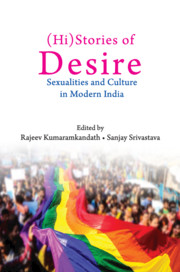Book contents
- Frontmatter
- Contents
- List of Images
- Acknowledgements
- Introduction: Sexuality and Sexualities
- 1 Politics of Prop Roots: Beyond ‘The Repressive Hypothesis’
- 2 Of Identities and Other Desires: Thinking about Sexualities
- 3 The Stuttered Process of Subject Formation: A Sex Worker's Experiments with Narration
- 4 Sexual Realism? (Hetero)Sexual Excess and the Birth of Obscenity in Malayalam Literature
- 5 Sexualizing Kālā Pāni
- 6 Memories of a Queer Sexuality: Revisiting Two ‘Toto’ Folk Tales
- 7 Learning about Sex in Mumbai: Rethinking the ‘Knowledge Gap’ Debate in Sexuality Education
- 8 Family Planning and the Masculinity of Nirodh Condoms in India
- 9 Women and Their Bodies: Menstrual Celebrations and Construction of Sexuality in Assam
- 10 Tanjai Prakash: Between Desire and Labour
- 11 Hijra Intimacies and Inheritances
- Notes on Editors and Contributors
- Index
3 - The Stuttered Process of Subject Formation: A Sex Worker's Experiments with Narration
Published online by Cambridge University Press: 24 December 2019
- Frontmatter
- Contents
- List of Images
- Acknowledgements
- Introduction: Sexuality and Sexualities
- 1 Politics of Prop Roots: Beyond ‘The Repressive Hypothesis’
- 2 Of Identities and Other Desires: Thinking about Sexualities
- 3 The Stuttered Process of Subject Formation: A Sex Worker's Experiments with Narration
- 4 Sexual Realism? (Hetero)Sexual Excess and the Birth of Obscenity in Malayalam Literature
- 5 Sexualizing Kālā Pāni
- 6 Memories of a Queer Sexuality: Revisiting Two ‘Toto’ Folk Tales
- 7 Learning about Sex in Mumbai: Rethinking the ‘Knowledge Gap’ Debate in Sexuality Education
- 8 Family Planning and the Masculinity of Nirodh Condoms in India
- 9 Women and Their Bodies: Menstrual Celebrations and Construction of Sexuality in Assam
- 10 Tanjai Prakash: Between Desire and Labour
- 11 Hijra Intimacies and Inheritances
- Notes on Editors and Contributors
- Index
Summary
The publication of two autobiographies by Nalini Jameela was one of the key events that signalled the arrival of a new mode of configuring the sex worker in India. She published her first autobiography in 2005 and a second version after a gap of six months. This iconoclastic move of a sex worker to take on the status of an author and demand respect for her profession made her dual autobiographies the centre of media attention. While distancing myself from the rousing reception of Jameela's self-writings as a radical move and its denouncements by its detractors, I argue that these narratives of selfcomposition point to how a marginalized subject not only has to engage with the public discourse but also critique it in order to give an account of the self. The reader can track the incomplete and fraught trajectories of the sex worker claiming political subjectivity through an engagement with Jameela's narratives. I analyse the state discourse on the sex worker, especially within HIV/AIDS interventions, and its relationship to the sex worker's struggle to claim a political subject position. Through a close study of the formal and thematic experiments staged through Jameela's self-narratives, I will analyse how the sex worker uses cultural practices in order to ‘claim the day’.
Experiments with self-narration
Oru Laingika Thozhilaliyude Atmakatha (The Autobiography of a Sex Worker, Jameela 2005a, hereafter Oru) by Nalini Jameela was published in June 2005 by DC Books, one of the largest publishing firms in Kerala. It was advertised as the first autobiography of a sex worker in Kerala. The first book came out in six editions in one hundred days, and Jameela became well known in Kerala because of the debates on the controversial book in print and visual media. Media reports labelled Nalini Jameela's book as a candid, defiant document of ‘the life of the silenced’. The book was packaged as a ‘burning, spinechilling’ exposé of the life of a sex worker. It garnered massive attention and debate in the regional, national, and international media. The book publicity also focused on how Jameela deviated from the familiar profile of the ‘author’ because of her underprivileged caste, class, and professional status. She grew up with limited means in a working-class family of the non-dominant Ezhava caste.
- Type
- Chapter
- Information
- (Hi)Stories of DesireSexualities and Culture in Modern India, pp. 40 - 57Publisher: Cambridge University PressPrint publication year: 2020



